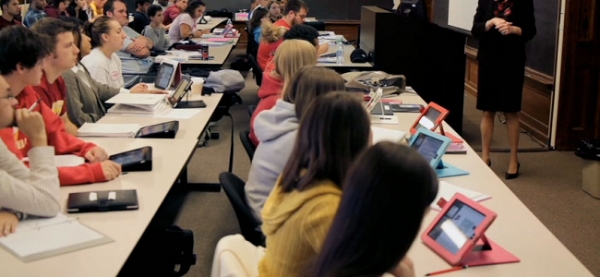"Simulations allow kids to experience situations such as oil spills, forest fires, or poor water supplies as if they were there."
E-learning is often praised, with many believing digital delivery of knowledge can aid language skills and abstract thinking, but there is a concern with this technique – that it’s too far removed from the real world to allow children to pick up necessary life skills. This is why the use of real-life simulations is gaining popularity in the classroom. Enabling teachers to incorporate experiential learning in a classroom setting, real-life simulations can help students gain knowledge through a variety of experiences while utilising the benefits provided by e-learning and technology.
Simulation in Career Training
While simulation hasn’t quite become the norm in the classroom just yet, it has been used for many years in relation to career training. The technique allows for a multitude of different situations to be experienced in a lifelike manner that would perhaps be dangerous or costly to implement in reality. Simulation has been used for driver practice and pilot training, which allows for adverse conditions to be experienced safely, and it also plays a major role in the training of immigration officials, who are given a comprehensive overview of issues encountered at international border crossings, allowing them to experience different situations and practice interview techniques.
Simulation in the Classroom
With simulation proving to be such a beneficial component in career preparation, it’s possible that the method could also provide many advantages in the classroom environment. You may be asking how simulation could be used to teach school-aged children and deliver knowledge in a way that’s fun, innovative, and educational. Here are three possible options:
1. Environmental Concerns
Simulation programmes that mimic environmental conditions can be hugely beneficial in helping children to visualise issues that perhaps don’t affect their part of the world, such as oil spills, forest fires, or poor water supply. Simulations allow kids to experience these situations as if they were there, gaining what is almost first-hand knowledge of the situation and enabling them to think logically about solutions and about how their actions at home could benefit the environment.
2. Human & Animal Life Forms
Learning about the human body, or animal anatomy, via a series of diagrams can make it difficult for children to understand how that imagery relates to their own body, or to the body of an animal. Educational simulation programmes are available that take kids on a guided tour of the human body, allowing them to learn as they experience the simulated beating of the heart, the flow of blood through the veins, and the repair of muscle. Additionally, dissection simulators allow students to gain a more thorough understanding of animals without needing to physically dissect the creature.
3. Financial Responsibility
Stock market simulations can be a fun way to pass time for adults, but for older students, they can prove to be very beneficial in teaching financial responsibility – an important life skill. Digital simulation games allow children to observe the implications of their actions, teaching them about risk and giving them the experience of business and trading without exposure to the market. Even fun games can provide a more unique experience than mere roleplay, allowing kids to learn through an interactive environment.
Learning via Experience
The concept of experiential learning is slowly beginning to be incorporated into the classroom, enabling children to learn by doing, rather than by listening. Research shows that learning by experience can be beneficial in delivering knowledge to children, while blending this method with technology-driven e-learning particularly targets the digital natives. Simulation is an excellent way of allowing children to experience a variety of different situations and conditions that would be challenging to replicate in real life, providing a more comprehensive learning environment.
What e-learning technology has helped you the most over the last year? Let us know in the comments!


















